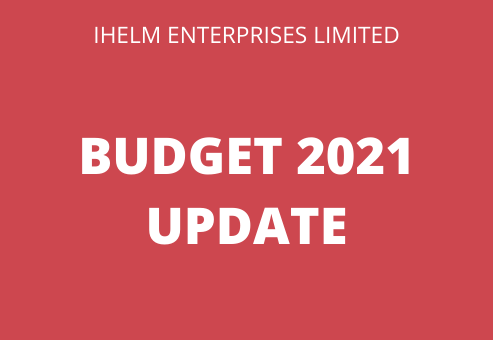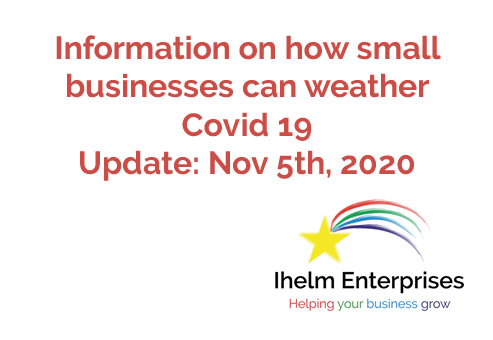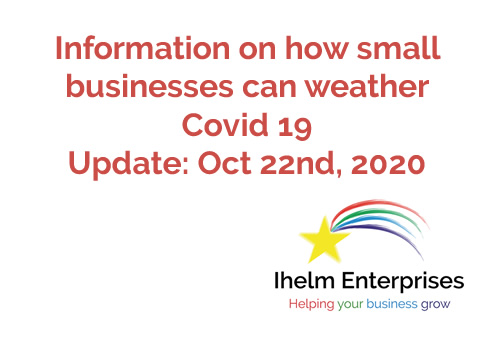On Wednesday, March 3rd, 2021, Rishi Sunak, Chancellor for the UK unveiled the budget for this year. Continued support for businesses dealing with the effects of Covid was the main focus, with plans for the recovery of the economy. I won’t be going through every aspect of the budget but will highlight some of the key points that affect businesses. As always, as further information is related I will provide more updates both on the blog and the Ihelm Enterprises FB Page.
1) Coronavirus Job Support Scheme
The Job Retention Scheme that has helped employers throughout the pandemic is being extended to Sept 30, 2021 and employees will continue to receive 80% of their unworked wages (up to £2,500) but the amount employers must contribute will change.
From July 1st, 2021 the amount the scheme covers will be reduced and the amount employers contribute will increase.
July 2021 – 70% of wages (up to £2187.50) covered
– employers must pay 10% (up to £312.50) of hours not worked
August and Sept 2021 – 60% of wages (up to £1875) covered
– employers must pay 20% (up to £625) of hours not worked
Employees will continue to receive 80% of the wages for hours not worked until the end of the scheme.
Any employees that were employed and on your payroll as of March 2nd, 2021 (ie you have made an RTI Submission for them between March 20, 2020 and March 2nd, 2021) can be included in any claims from May 1st, 2021 onwards.
Read here for changes to the scheme: https://www.gov.uk/government/publications/changes-to-the-coronavirus-job-retention-scheme/changes-to-the-coronavirus-job-retention-scheme
This is the main page for the JRS: https://www.gov.uk/guidance/claim-for-wages-through-the-coronavirus-job-retention-scheme
2) Self-Employed Income Support Scheme
Further information about the fourth grant has now been published as well as news of a fifth grant being made available, bringing the support inline with the Job Retention Scheme.
The fourth grant will pay out 80% of 3 months’ average trading profits up to £7,500. The grant will also take into consideration the 2019/2020 tax return, meaning those who became self-employed during the 2019/2020 tax year are now eligible for this grant! The rest of the eligibility criteria is still the same.
This means that HMRC will now include your 2019/2020 tax return when calculating your average trading profits, so if you received the other grants it could mean you receive a different amount compared to before.
You will need to have traded in both the 2019/2020 and 2020/2021 tax years and submitted your 2019/2020 tax return by March 2nd, 2021. The grant will be available from late April 2021 to May 31, 2021 and if you are eligible, HMRC will contact you in mid-April.
The fifth grant will cover the period May 2021 to September 2021 and it will be based on how much your turnover has reduced in the year April 2020 to April 2021. It will be worth 80% of 3 months average trading profits up to £7,500 for any business with a reduction in turnover of 30% or more and 30% of 3 months average trading profits up to £2,850 for those with a turnover reduction of less than 30%.
For more information read here: https://www.gov.uk/government/publications/self-employment-income-support-scheme-grant-extension/self-employment-income-support-scheme-grant-extension
3) New Restart Grant
A scheme that will help businesses to restart after being in lockdown has been announced. It will be a one-off grant of up to £18,000 and only available to those businesses that have not been allowed to trade normally due to lockdown restrictions. This includes non-essential retail shops, restaurants, hotels, personal care businesses, the leisure sector and other businesses that were forced to close.
Non-essential retailers will receive up to £6,000 while those in the hospitality, personal care and leisure sectors will receive up to £18,000.
The grant will be provided by local authorities. The new scheme replaces two other local support schemes that had been set up and that close at the end of March 2021.
At the time of writing, I haven’t been able to find any additional information about these grants on the UK Government website, but I will share it as soon as I do.
4) Recovery Loan Scheme
This is a new loan scheme that will be accessible to any business within the UK, no matter their size. The loans will be for between £25,001 and £10 million, and asset and invoice finance between £1,000 and £10 million. The new loan scheme will launch in April 2021 and replace the current BBL and CBIL schemes. Further details are supposed to be released in the next few weeks and as this information is made available I will share it.
5) VAT Cut Extended
The VAT cut to 5% for hospitality, accommodation and attractions will now continue until the end of September 2021. The rate will then be increased to 12.5% until March 31, 2022.
6) Business Rate Relief
The business rates relief has been extended until the end of June 2021. At that point in time, rates will be discounted to 1/3 of the normal charge for a further 6 months up to a value of £2 million for all businesses that have been forced to close this year.
7) Corporation Tax
An increase of corporation tax up to 25% will be put in place from 2023 and affect businesses with profits of £250,000 or more. Businesses with profits of £50,000 or less will continue to be taxed at 19% while businesses with profits between £50,000 and £250,000 will be taxed using a tapered rate. As more information is released, I will share it with you.
8) Income Tax Personal Allowance
After the increase of the personal allowance in April 2021 to £12,570 per year, the rates will be frozen until April 2026. This will mean that as people’s income increases, more people will move into the higher tax brackets.
The 2021-2022 National Insurance Contributions threshold will increase – the primary threshold/lower profits limit to £9,568 and the upper earnings limit to £50,270. The UEL will then stay the same until April 2026.
There are many other items that have been announced with the budget, but I am not going to cover them. You can read the announcements made yesterday here: https://www.gov.uk/government/news/budget-2021-what-you-need-to-know.
As more information is released, I will continue to share it within the blog posts and on the Ihelm Social Media platforms.










